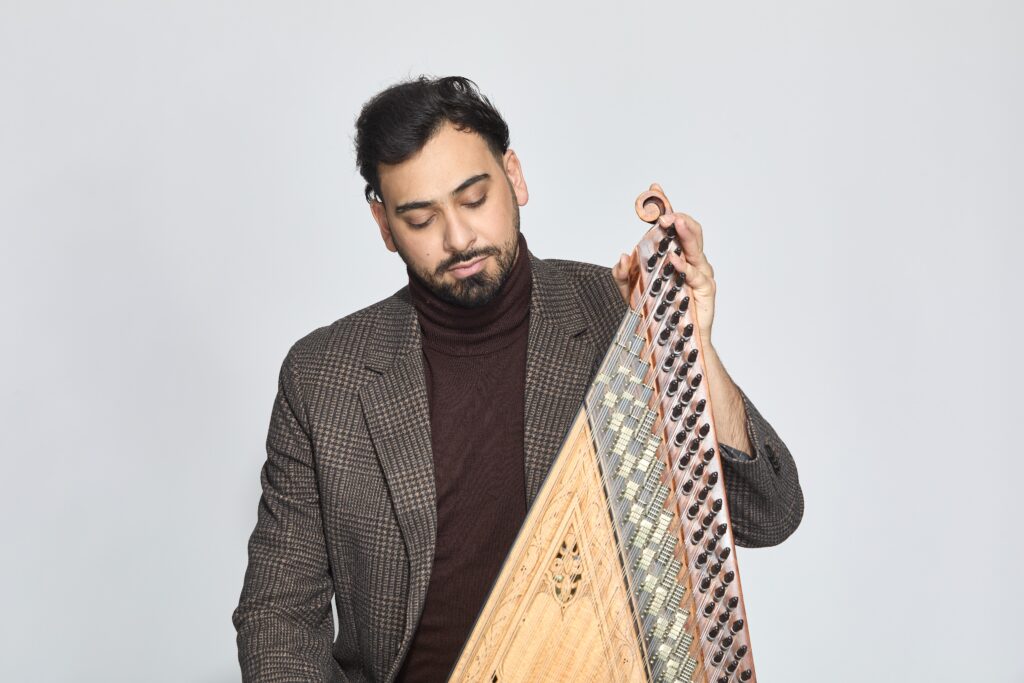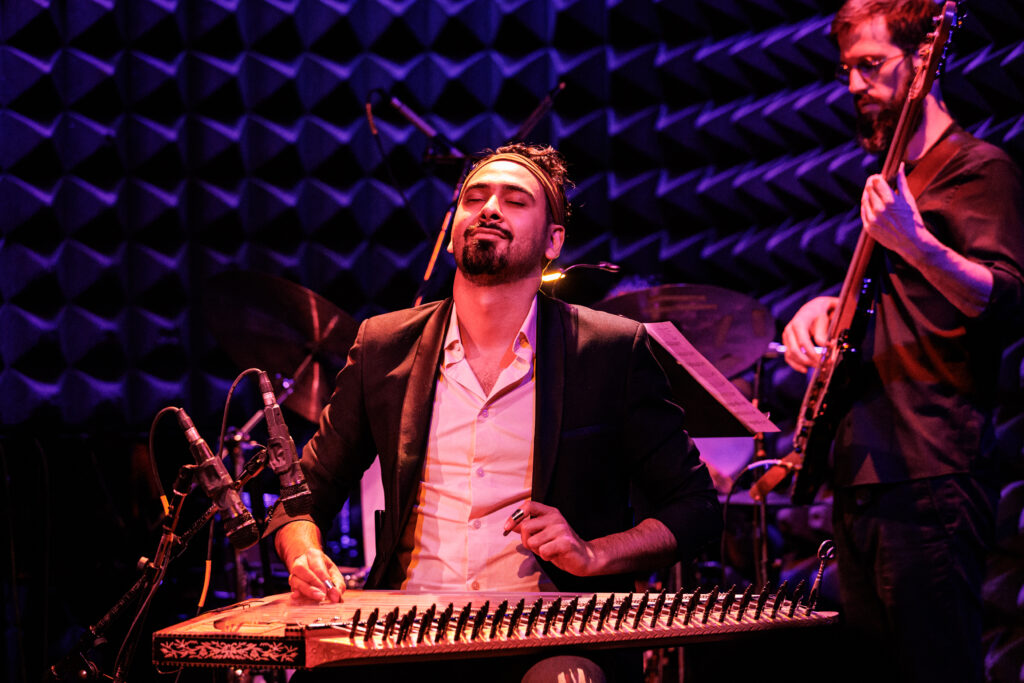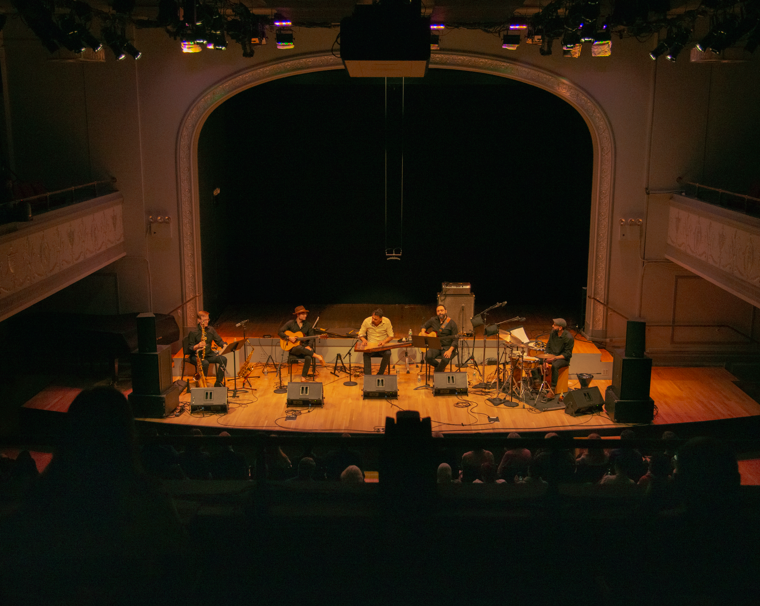"Connect with Your Roots": 40 Minutes with Firas Zreik

By: Layan Srour / Arab America Contributing Writer
Firas Zreik’s musical journey is one of passion, tradition, and exploration. A Palestinian composer and qanun player, he blends the rich sounds of Arabic music with influences from jazz and beyond. Raised in a family of musicians, Firas was immersed in music from a young age, which sparked his deep connection to his heritage. Now living in New York, he continues to push boundaries, performing, teaching, and collaborating with artists around the world, all while staying grounded in his cultural roots.
What about your upbringing influenced you to go into music?
I grew up in a musical family. My mother, Amal Murkus, is a singer, and my dad – aside from being an architect in profession – is a composer and Oud player. I spent my childhood surrounded by rehearsals, recording sessions, and concerts. Our home was always filled with musicians, so naturally, I was drawn to music.
At the age of eight, I joined the conservatory and studied classical cello for a few years before transitioning to the qanun. That shift was a pivotal moment in my musical journey because it allowed me to play our music—the Arabic repertoire, microtones, Maqamat, and folk traditions. This completely changed my perspective. I became so much more invested and passionate about music that I would play for hours. It wasn’t a burden, it was something I wanted to do.
After high school, I learned that Berklee College of Music was holding auditions in Jerusalem. Knowing that Berklee had faculty members like Simon Shaheen was even more of a reason for me to apply. I didn’t want to study only Arabic music—I was already fluent in it—but I also didn’t want to study Western music in a way that disconnected me from my roots. Berklee felt like the perfect balance. After being accepted on a full scholarship, I moved to Boston at the age of nineteen, and here I am, ten years later.
Who were your influences growing up?
I was exposed to a lot of music by Wadih El Safi, Fairuz, Marcel Khalife, and a lot of music from Lebanon. During my teenage years, I got into Egyptian music, specifically Umm Kulthum, Sunbati and Abdel Wahab. These artists shaped a lot of my musical identity and influence and gave me a lot of vocabulary. My sister was studying jazz piano at the time, so she got me into jazz a lot. My mother, being an international singer, used to travel a lot. She brought a lot of music home, so I would listen to flamenco, Baroque, jazz, blues, fusion and lots of Turkish music.
From an early age, I was exposed to different global musical styles, but I was mostly drawn to the Levantine and Egyptian repertoire. I started to understand who my instrumental heroes were, like Muhammad Abduh Salih, the qanun player and bandleader for Umm Kulthum. He was like a mentor to me. Other idols include Paco de Lucia, John Coltrane, Bach, Charles Mingus, Armstrong, and many more.
You mentioned that your sister was a jazz pianist. Was jazz present in your musical upbringing?
She mostly played jazz standards and ballads on the piano. When I had to choose a major at Berklee, majoring in jazz seemed like this “hip idea”, but I also saw it as a gateway to any musical style. One of jazz’s greatest traits is its openness to adaptation. I knew I wanted to study performance because I saw myself as a performer—I wanted to be on stage. But I also wanted to double major in composition. My other option was classical composition, but I eventually decided to major in jazz composition, as well as performance.
So, I studied a lot of jazz repertoire. I learned to write for big bands, arrange, apply voicing techniques, and use harmonization and reharmonization methods. These tools helped me shape my own sound. But I never claimed—or wanted—to be a jazz musician. I don’t consider myself one. I see myself as a friend of the tradition. Even in New York, where I perform in jazz clubs and am part of the jazz community, I don’t call myself a jazz musician. For me, jazz was a gateway to other realms of music.
Playing jazz was both fun and challenging, especially styles like bebop, which is heavily chromatic. The way the qanun works makes chromatic melodies particularly demanding due to its mechanism, so bebop isn’t naturally qanun-friendly. Swing was also a challenge because, as a Maqam musician, I had to internalize its distinct rhythmic feel. Swing is deeply rooted in Black music, after all.
While many aspects of jazz were new to me, there were also strong similarities. Coming from a deep-rooted tradition like Maqam, I found connections between the two. Studying jazz scales, I could compare them to Maqamat. The entire concept of improvisation in Maqam is reflected in jazz, as both traditions are deeply oral and emphasize improvisation.

What was it like for you and the community to integrate the qanun into jazz music?
Jazz is Black music. Today, we see a lot of non-Black musicians playing jazz, so is that considered an infiltration in itself? Jazz, as we know it now, is also shaped by Cubans, Puerto Ricans, and Brazilians and people from many other cultures who fused their culture into jazz. For example, the record between João Gilberto and Stan Getz is a classic now. I can’t imagine jazz without it.
I bring my tradition and try to keep it fresh—preserving it, but also adding new colors to it.
How would you describe your musical style?
My musical style is fresh and sincere. Fresh because it belongs to the “now” and is timeless. Sincere because it reflects who I am musically. I could place myself in a specific genre, but I believe these terms are more about marketing and media. Authenticity is important because I understand the tradition I come from. With the tools I’ve gained through my studies, I know how to combine them in a unique way.
I always say that a musician’s true identity is shaped by what they’ve listened to, not just what they’ve studied or where they come from. What you’ve listened to will inevitably find its way into your music. I’m a product of all of that. I think it’s counterproductive to get caught up in these divisions.
Have you faced any challenges as a performing Arab artist?
Most Western audiences have never seen a qanun before, so they’re already intrigued when they see it for the first time. Performing for Arab audiences is different—they’re familiar with the qanun and the maqam sound, but they’ve never encountered it in these contexts. They’ve never heard the qanun improvising over harmonic structures or using extended techniques, or being the lead instrument on stage.
Sometimes, I get asked, “Do you play any other instruments?” It might seem like an innocent question, but to me, the implication is, “Do you play any real instruments? Western instruments?”
That question has always struck me as internally racist and condescending. So when I do solo shows, I’ll pull out a Bach Sonata. People are mesmerized. The point isn’t just that this instrument is capable and versatile, it’s that I can also play the peak of Western music. What’s greater than Bach? No, I don’t play another instrument. But yes, this is a real instrument.

How has your approach to music changed in light of recent events?
When your people are going through genocide, playing music, promoting shows, and releasing albums can feel absurd, irrelevant, even silly. It feels silly because, in the historical lens, during historical moments like these, you want to be on the right side of history. I think about 50 years from now, what will my grandchildren ask? “What did you do during the genocide?” And I’d have to say, “Oh, I was playing music.” How ridiculous is that? There’s also the helplessness; you see all these atrocities, and you can’t do much.
Everything else becomes secondary. I don’t like to give music that much credit, because a lot of artists credit themselves as “resisting through their art,” which is a fun idea to entertain. But I feel like you’d be crediting yourself too much if you say that, because you’re not paying the price on the ground. You’re touring, you’re staying at five-star hotels, going to galas, getting awards. Sure, it’s one thing to use your platform to be vocal about your people’s struggles, but it’s a whole other thing to use that struggle to progress your career.
What would you say to artists who view their work as a form of activism?
Whatever you do, whether it’s being vocal about something, making a statement, or making a song, try not to romanticize it or profit from it. Put the cause first.
What messages or emotions do you strive to convey through your music?
I like to create beauty. Art, in its abstract form, can be beautiful, but it can also be provocative and exciting. My music spans a whole spectrum of emotions. Some of it might help heal grief, feel cathartic, excite you, or uplift you.
As a composer, I can’t predetermine what you’ll feel. I don’t actually hope for a specific emotion, but I can probably steer you in a certain direction. I do this not just through the music itself, but also through how I present it. As long as there’s emotion, I’m happy.
What advice would you give to Arab Americans aspiring to enter the music world?
Connect with your roots. Try to learn and master your language, and listen to your people’s music. Connect with yourself. If you can’t do it linguistically, at least do it musically.
About the Article and Author: Layan Srour, a Lebanese musician based in Detroit, Michigan, is passionate about blending her culture through music, research, and education in the United States. 40 Minutes With is a weekly feature where Layan interviews an Arab American musician, exploring their journey through music and culture in America. Connect with Layan on Instagram, Facebook, LinkedIn, or via email.
Want more articles like this? Sign up for our e-newsletter! Check out our blog here!








